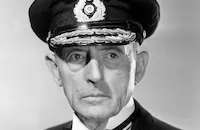A Woman Commands
Cast & Crew
Paul L. Stein
Pola Negri
Roland Young
Basil Rathbone
H. B. Warner
Anthony Bushell
Film Details
Technical Specs

Synopsis
In order to keep his lover, Maria Draga, in luxury, Captain Alex Pastitsch of Serbia contracts huge debts, which threaten his military career. To save Alex's career, his superior officer, Colonel Strádimirovitsch, goes to Maria and beseeches her to abandon the affair. Although in love with Alex, Maria agrees to the sacrifice and pretends that she is interested in another man. Without Alex's knowledge, Maria then sells some of the jewels that he had bought her and repays his outstanding debts. Soon after, Maria returns to her former occupation of cabaret dancer and becomes an enormous success, performing in Vienna, Berlin and Budapest. While Maria is performing in Serbia one night, King Alexander, the Serbian ruler, visits the cabaret and is immediately impressed by her. She agrees to accompany Lieut. Iwan of the royal guard to the king's palace and extracts a promise from him to discover the whereabouts of Alex. After a night of revelry at the palace, the drunken ruler is visibly disappointed when Maria refuses his invitation to share his bed. The king summons one of his officers to escort Maria home, and she is stunned when Alex by chance appears. Assuming the worst about Maria and the king, Alex insults her while taking her home. To escape the king's persistent attentions, Maria tries to flee to Vienna, but is forcibly removed from the train and brought to the king. At the palace, the king, whose ministers and military advisors have warned him against pursuing the dancer, proposes to Maria in a half-drunken state, and she accepts, realizing the power she will gain by such a union. During a military parade held in honor of the new queen, Alex refuses to salute Maria and is sent to prison. After pleading Alex's case for nearly a year, Maria finally convinces the king to free Alex and reinstate him in the guard. As predicted by his prime minister and other advisors, the king's marriage to Maria causes strife within the kingdom, and on the day that her son Milan is to be christened, a group of revolutionaries bomb the cathedral where the ceremony is taking place. Maria instructs Mascha, her servant, to flee with Milan, and then retreats to the palace with the king. The army storms the palace, and the revolutionary committee, of which Alex is a member, confronts the king. When one of the revolutionaries shoots and kills the king, Alex is momentarily horrified. As the new king, Peter Georgevitch, is installed, Strádimirovitsch instructs Alex to persuade Maria to sign abdication papers. After the colonel tells him how Maria had paid his debts and arranged for his release from prison, Alex informs her that the document she is about to sign will declare her son a bastard. When Maria refuses to sign the papers, the colonel, without Alex's knowledge, orders her brought before a firing squad. Moments before she is to be executed, however, Strádimirovitsch decides to spare Maria and allow her to live in exile with Alex. Maria and Alex then join Mascha and Milan in a neighboring country.

Director
Paul L. Stein
Cast

Pola Negri

Roland Young

Basil Rathbone

H. B. Warner

Anthony Bushell

Reginald Owen
May Boley

Frank Reicher
George Baxter
David Newell
Cleo Louise Borden
Frank Beek
Frank Dunn
Carl Stockdale
Lorimer Johnson
Paul Porcasi
Max Lucke
Lillian Ward
Allan Cavan
Charles Mcmurphy
Crew
E. J. Babille
Harry Joe Brown
Harry Joe Brown
Nacio Herb Brown
Nacio Herb Brown
Carroll Clark
Gordon Clifford
Thilde Forster
Ken Frank
Bert Gilroy
George Hively
Horace Jackson
Horace Jackson
Milton Krasner
Arthur Lange
Daniel Mandell
Arthur Miller
Hal Mohr
Val Paul
C. T. Pyle
Charles R. Rogers
Emmett Schoenbaum
William Skall
Clarence Slifer
Robert Surtees
Gwen Wakeling
Earl A. Wolcott

Film Details
Technical Specs

Quotes
Trivia
Notes
Adventuress María Draga Mashin, the widow of a Czech engineer, served as the Queen of Serbia from 1900 to 1903. Alexander I Obrenovich ruled as King of Serbia from 1876 to 1903. Both he and Maria were executed by a group of military officers in 1903. A plot synopsis deposited with the copyright records describes an ending different from that of the filmed conclusion. According to the synopsis, after being captured, "Maria" agrees to participate in a dangerous escape attempt devised by "Alex," but then sacrifices her own life so that he will not be killed. Although started at RKO Pathe, A Woman Commands was taken over by RKO Radio and was released under the Radio banner. The viewed print included separate credits for both editor and film editor. Studio production files indicate that the total cost of production was $415,431. Pola Negri made her American sound film debut in this picture. According to New York Times, at the New York premiere of the film, Mayor Jimmy Walker introduced Negri to a large, appreciative crowd. Critics commented favorably on both her acting and her singing, but also made note of her thick Polish accent. According to studio records, she was paid $30,000 for her performance. Although Negri's contract with RKO allowed for several additional pictures, The Woman Commands was the only film she made at that studio. Laurence Olivier was announced in a pre-production Film Daily news item as Negri's co-star. According to Negri's autobiography, after Olivier was stricken with jaundice, he was replaced by Basil Rathbone. In her autobiography, Negri mentions that her rendition of the film's song, "Paradise," became an international hit after the picture's release. Two months after filming was completed, Negri, stricken by acute appendicitis, was operated on at Santa Monica Hospital. According to her autobiography, the appendicitis, which had started before shooting on The Woman Commands began, almost killed her. Negri states in her autobiography: "...the box office receipts for A Woman Commands were not high enough to offset the Hollywood rumor that my health would never stand up under the rigors of making another film." Modern sources, however, contend that Negri's lack of success in sound films was due to her gutteral Polish accent. A Film Daily pre-production news item states that RKO was to hire 2,000 to 5,000 extras for the production. Another Film Daily news item notes that Stanley Cortez, the brother of actor Ricardo Cortez, was to do second camera work on the film. His contribution on the final film has not been confirmed, however. According to modern sources, the film lost RKO $265,000.












